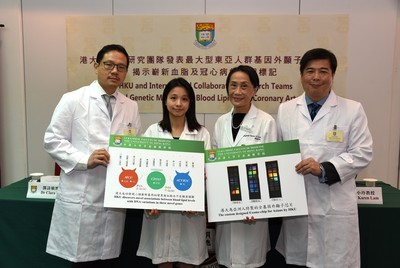HKU and International Collaborative Research Teams
Discover Novel Genetic Markers for Blood Lipids and Coronary Artery Disease
30 Nov 2017
The research team at the Li Ka Shing Faculty of Medicine, The University of Hong Kong (HKU), in collaboration with the University of Michigan, USA, the Chinese Academy of Medical Sciences and Peking Union Medical College, China, and several other international collaborative research teams, identified novel blood lipids-associated genes in East-Asians, which will help assess the risk of East-Asians developing coronary artery disease (CAD). These important discoveries are now published in the leading scientific journal Nature Genetics.
CAD is one of the leading causes of mortality worldwide. In 2015, over 10 people died from CAD each day in Hong Kong. Abnormal blood lipid levels, commonly defined by low level of high-density lipoprotein (HDL) cholesterol, high levels of triglyceride (TG), low-density lipoprotein (LDL) cholesterol, and total cholesterol (TC), are important modifiable risk factors for CAD. The second Population Health Survey recently released by the Department of Health indicated that abnormal blood level lipids become more prevalent in Hong Kong in the past ten years. Around 50% of Hong Kong people aged 15 to 84 have abnormal blood lipid levels. A previous Asian-Pacific study reported that each 1 mmol/L increase in TC could lead to 35% increase in the risk of death caused by CAD. These blood lipid levels are not only influenced by our lifestyle and daily diets, but up to 50% of the variation in blood lipids are determined by our genetic composition. Unfortunately, currently available data linking lipid levels and genetic factors have been largely derived from the Western populations. Dissecting the link between genetic factors and lipid levels among Eastern populations could therefore shed light on the underlying genetic mechanisms and offer potentially new therapeutic targets with CAD.
With the support from the Theme-based Research Scheme of the Hong Kong Research Grant Council, the collaborative research teams have conducted the largest exome-wide genetic study in East-Asians using the state-of-the-art comprehensive custom gene chip (Exome-chip) to detect the genetic markers for blood lipid levels; and subsequently compared and meta-analysed the data with over 300,000 individuals from the Global Lipids Genetic Consortium (GLGC). The Exome-chip is specifically designed for assessing protein-altering DNA variations in the coding regions of the human genome (exome). These DNA changes, through disrupting the protein structure and function, might interfere with the related biological pathways. This study is by far the largest trans-ethnic genetic study aiming to decipher the genetic basis of blood lipid levels.
Key research findings
In this study, a total of 47,532 East Asian participants were recruited from Hong Kong, China, Taiwan and Singapore. Using the custom designed Exome-chip, the research teams discovered novel associations between blood lipid levels with DNA variations in three novel genes (ACVR1C, MCU and CD163) that have not been previously reported, and also 14 East Asian-specific protein-altering variants in 11 known genes. Further integration of the Exome-chip data with over 300,000 individuals, primarily of European ancestry, recruited by the international GLGC, revealed an additional nine novel variants associated with blood lipids across populations. Examination of these lipid-associated variants in 28,889 Chinese individuals with and without CAD together with ~185,000 CAD cases and controls from the CADIoGRAMplusC4D consortium highlighted strong correlation between their effects on LDL cholesterol level and CAD risk, which includes the newly identified LDL-lowering MCU variants that offers protection against CAD. These groundbreaking findings will help assess the risk of CAD in our Asian population and elucidate the underlying disease mechanisms. Overall, the new findings demonstrated that rare protein-altering variants are generally of larger effects and are likely to be population specific, which underscores the significance of discovering ancestry-specific lipid-associated variants in East Asians using Exome-chip.
Precision medicine is an emerging approach for improved medical care whereby diagnosis, treatment and prevention of diseases are customised according to the individual person’s genetic profile to promote good health. While existing panels for genetic risk prediction rely on discoveries from the Europeans, the findings published in this paper provide a new reference panel most relevant to the Asian population for risk prediction of abnormal blood lipid levels and CAD. This new panel can further facilitate the development of risk prediction array to inform clinicians on the high-risk group of individuals that require earlier monitoring or intervention. Moreover, the new knowledge also provides novel insights into the biology of lipid metabolism which can be translated to the discovery and development of new drugs for preventing heart disease through lowering blood lipids.
About the research team
The study was part of the Theme-based Research Scheme (T12-705/11) conducted at the Li Ka Shing Faculty of Medicine, HKU, which was co-ordinated by Professor Tse Hung-fat, William MW Mong Professor in Cardiology, Chair Professor of Cardiovascular Medicine of the Department of Medicine and co-led by him together with Professor Sham Pak-chung, Suen Chi-Sun Professor in Clinical Science, Chair Professor of Psychiatric Genomics and Director of the Centre for Genomic Sciences, and Professor Karen Lam Siu-ling, Rosie TT Young Professor in Endocrinology and Metabolism, Chair Professor of Medicine of the Department of Medicine, Li Ka Shing Faculty of Medicine, HKU, in collaboration with Dr Cristen Willer at the University of Michigan, USA and Professor Gu Dongfeng at the Chinese Academy of Medical Sciences and Peking Union Medical College, China. The research team thanked the funding support of the Theme-based Research Scheme (T12-705/11), Research Grants Council of Hong Kong, and Mr and Mrs Oliver Wong, for their generous donation in support of the core genotyping facility.
Media enquiries
Please contact Li Ka Shing Faculty of Medicine of The University of Hong Kong by email (medkefa@hku.hk).
To use the press release photo(s) for any publishing, publicity and related purpose, photo courtesy should be given to “Li Ka Shing Faculty of Medicine, The University of Hong Kong”.

The research team took a group photo at the press conference. (From left) Professor Tse Hung-fat, William MW Mong Professor in Cardiology, Chair Professor of Cardiovascular Medicine, Department of Medicine; Dr Clara Tang Sze-man, Research Assistant Professor, Department of Surgery; Professor Karen Lam Siu-ling, Rosie TT Young Professor in Endocrinology and Metabolism, Chair Professor of Medicine, Department of Medicine; and Professor Sham Pak-chung, Suen Chi-Sun Professor in Clinical Science, Chair Professor of Psychiatric Genomics, Director of the Centre for Genomic Sciences, Li Ka Shing Faculty of Medicine, HKU.

Professor Tse Hung-fat, William MW Mong Professor in Cardiology, Chair Professor of Cardiovascular Medicine, Department of Medicine, Li Ka Shing Faculty of Medicine, HKU says, the research teams discovered novel associations between blood lipid levels with DNA variations in three novel genes that have not been previously reported, and also 14 Asian-specific association involving coding variants.

Professor Sham Pak-chung, Suen Chi-Sun Professor in Clinical Science, Chair Professor of Psychiatric Genomics, Director of the Centre for Genomic Sciences, Li Ka Shing Faculty of Medicine, HKU points out that the findings provide a new reference panel most relevant to the Asian population for risk prediction of abnormal blood lipid levels and coronary artery disease. It can further facilitate the development of risk prediction array to inform clinicians on the high-risk group of individuals that require earlier monitoring or intervention.
